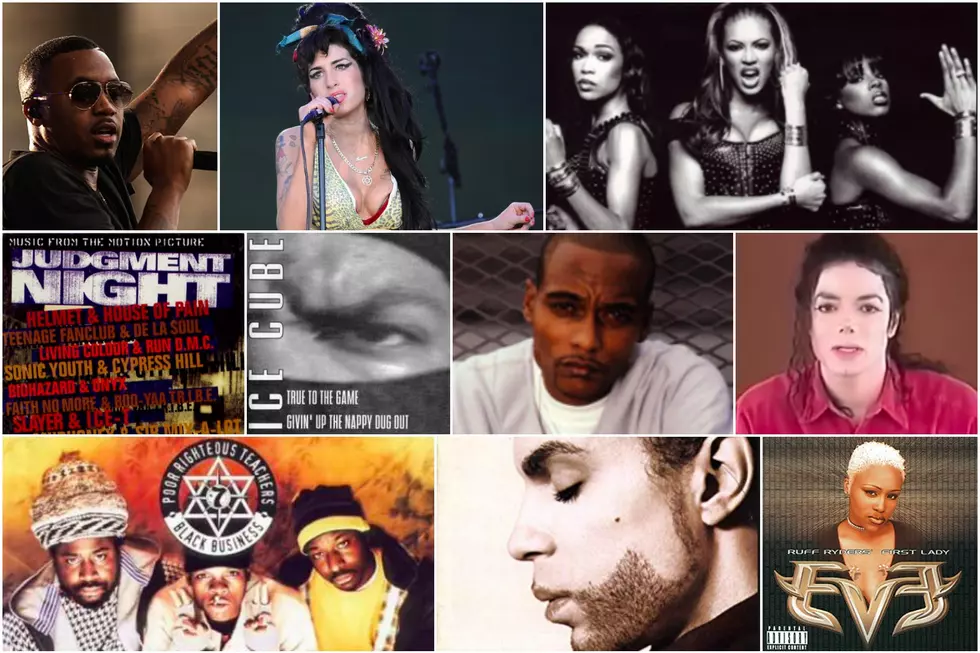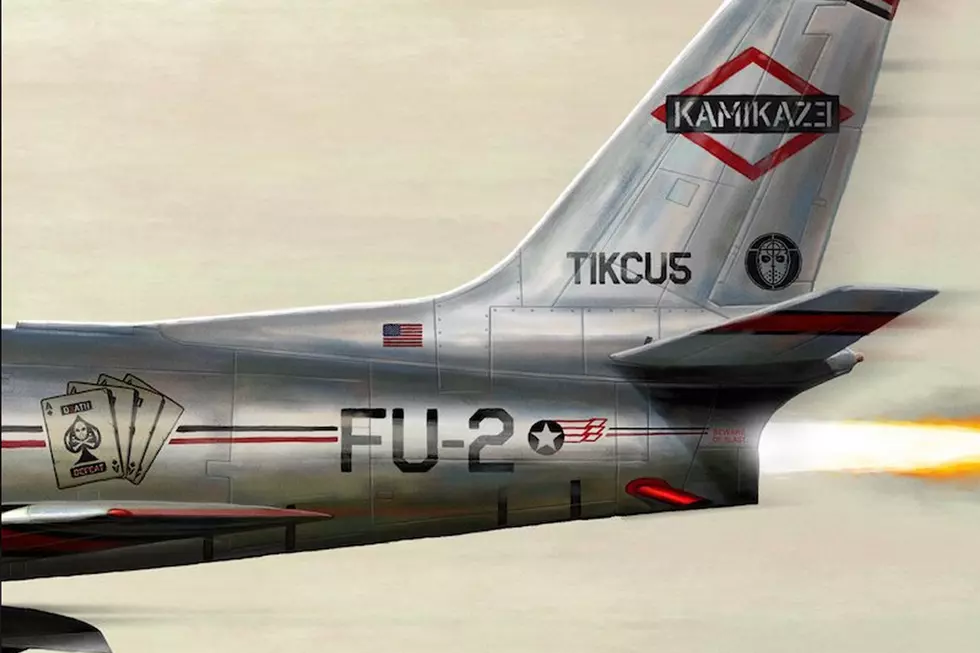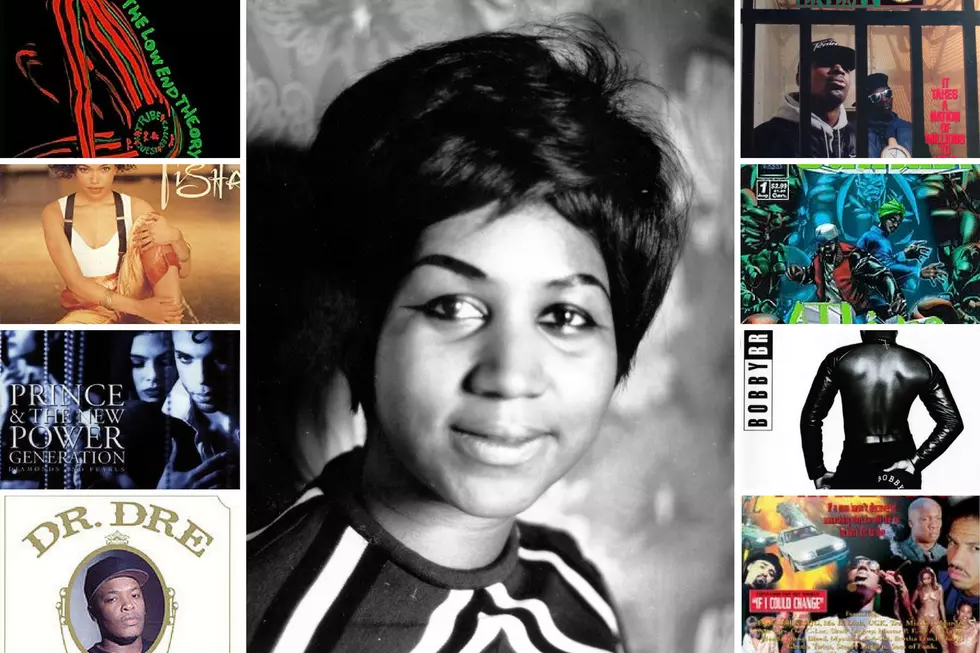
N.W.A.’s ‘EFIL4ZAGGIN’ Upped the Ante For Gangsta Rap In the Mainstream
"Why do I call myself a nigga, ya ask me?" MC Ren muses on "Niggaz 4 Life," the title-track from EFIL4ZAGGIN, N.W.A.'s explosive sophomore LP. The album came at a time when hip-hop culture was emerging as a dominant force in mainstream America; it's popularity spreading among fans of all colors and creeds. This fact was solidified with the release of Niggaz4Life, which coincided with the implementation of Soundscan, a tracking system that accounts for all record sales. N.W.A.'s previous albums both racked up over one million copies sold, but Niggaz4Life's first-week numbers would prove to be historic.
Totaling over 954,000 copies sold and debuting at No. 2 on the Billboard 200, the highest-charting album debut since pop megastar Micheal Jackson's Bad in 1987, Eazy, Dr. Dre, MC Ren, and DJ Yella shocked the music industry's number crunchers, who were astounded at the sheer pandemonium that an album from a gangster rap group could generate. Although Beastie Boys were the first rap group to attain top billing with the No. 1 album in the country, N.W.A. would become the first gangsta rap act to achieve the feat, doing so without mass radio airplay or any huge crossover singles, which spoke to the anticipation that the group's 1990 EP, 100 Miles and Runnin' had built.
That EP, which can be seen as a bridge between their classic debut, Straight Outta Compton, and Niggaz4Life, was framed as a response to former group member and lead lyricist Ice Cube's decision to jump ship amid financial dispute with group founder Eazy-E and their manager, Jerry Heller. Dropping his solo debut, AmeriKKKa's Most Wanted, in May of 1990, Ice Cube would quickly become a breakout solo star, with AmeriKKKa's Most Wanted going platinum without a proper lead single and limited promotion or airplay. He would also become one of the first rappers to be cast in a key role in a major motion picture with his appearance in John Singleton's rugged coming-of-age flick, Boyz n the Hood, the title ironically inspired by the hit Eazy-E song that he had penned years earlier.
Cube's defection and subsequent success didn't sit well with N.W.A., who would send unprovoked barbs towards their former bandmate throughout 100 Miles and Runnin'. On the title track, which saw Dr. Dre slyly note "Started with five and, yo, one couldn't take it/So now there's four cause the fifth couldn't make it," in reference to Cube, but it would be the song, "Real Niggaz," that packed the most vitriol. Some of the lyrics may have been attributed to the steady rise of gangsta rap groups, many of whom piggy-backed off of the mass success of N.W.A.; but more than a few could be applied to Cube, but MC Ren made sure to take a direct shot at his friend-turned-foe. Rapping "They played out, that's what niggas were chanting/One nigga left and they said we ain't happening/People had thought we was finished and then done wit/But if you think about it, yo, we really ain't done shit yet."
100 Miles and Runnin' would reach platinum status, proving N.W.A. could withstand Ice Cube's departure from the group, and it increased fans' thirst for a proper follow-up to Straight Outta Compton. But before the album's release, N.W.A. would have to endure a firestorm of controversy, namely Dr. Dre, who would find himself in an encounter that would forever alter fans' perception of the gifted producer.
That same year, Dee Barnes, the host of the popular hip-hop show, Pump It Up!, interviewed Ice Cube, who explained his side of his breakup with N.W.A. during a segment that aired in November of 1990.
N.W.A. took issue with Ice Cube's comments on Pump It Up!, with the situation coming to a head in January of 1991 during a record release party in Hollywood during which Dr. Dre confronted Barnes. According to bystanders, Dre "began slamming her head and the right side of her body repeatedly against a brick wall near the stairway" while his bodyguard held off the crowd with a gun. After failing to throw Barnes down a flight of stairs, Dre began kicking her in the ribs and hands as she continued to attempt to flee. Barnes would press charges and file a lawsuit against Dr. Dre, with the producer pleading no contest to the assault and settling the lawsuit out of court. While Dr. Dre initially downplayed the altercation, stating "it ain’t no big thing—I just threw her through a door," his group-mate Eazy-E would detail the horrific assault during an interview with Spin magazine, while Dr. Dre was reluctant to talk about it, which could have played a part in their strained relationship following the release of Niggaz4Life.
Speaking of Eazy-E, the diminutive rapping CEO was generating press of his own, albeit for less nefarious reasons. In March of 1991, Eazy-E made an appearance at a ”Salute to the Commander in Chief” luncheon in Washington, sponsored by The National Republican Senatorial Committee. Invited by Senators Phil Gramm (R-Texas) and Bob Dole (R-Kansas), due to his charitable donations in the Los Angeles area, the news of the leader of the World's Most Dangerous Rap Group hobnobbing with the President generated plenty of chatter and may have played a part in the eye-popping first week sales tally of Niggaz4Life.
Released on May 28, 1991, Niggaz4Life was the biggest album release in hip-hop history up to that point, with many eager to see if N.W.A. could replicate the magic that made their debut such a critical and commercial success. But everyone wasn't so fond of N.W.A.'s return. On June 4, 1991, Scotland Yard confiscated 25,000 copies of Niggaz4Life a day after its release in the United Kingdom, pegging it as obscene. The album would be banned for four months before it was ruled that the album was not obscene, giving Niggaz4Life the distinction of being the only album to be seized and tried under the U.K.'s obscenity laws. Moving the needle was no problem for N.W.A., however, getting love from critics would be an entirely different story.
Writer Arion Berger, who reviewed the album for Rolling Stone, wrote, "Niggaz4life, N.W.A's second album, finds the group with less to prove but also with less to say — listening to it is like hearing the loudest guys at a neighborhood barbecue strut, brag, wolf-whistle and lie about sex." The endorsement was less than generous, to say the least, and was a sentiment shared by many mainstream news outlets, who wrote off Niggaz4Life as a pompous exhibition of thuggery, sexism, and criminality in the form of a rap album. Those assertions may hold weight on the surface level, but if you take a deeper look, you'll find that Niggaz4Life is one of the most complete rap albums to emerge in the genre's illustrious history. Featuring production by Dr. Dre and DJ Yella, with a majority of the rhymes written by MC Ren and frequent collaborator The D.O.C., Niggaz4Life is a tour de force from onset to outset and ousts any doubt that N.W.A. were on the downswing.
After warming up with a prelude that picks up where 100 Miles and Runnin's "Kamurshol" tapered off, the album opens on a epic note with the album opener, "Real Niggaz Don't Die." Barking "I got a case, of spittin in a motherf---er's face/So me and my ace, we got a taste/Of a motherfucker's billy club, he took his gun and/Put it to my head and said, "Nigga start runnin," Dr. Dre details a run-in with a bloodthirsty police officer with an agenda against African-Americans. MC Ren takes aim at the corrupt prison system on the second verse, rhyming "And don't let no paleface throw your ass in a snail race/Have your residence occupying a jail space/That's what they want to do cause the system is fucked around/I try to let you know with the records that's underground," before suggesting a call-to-arms to settle the score with the powers that be.
On "Appetite For Destruction," the lead-single from Niggaz4Life, Dr. Dre drops one of the first grisly quips on the album, with, "Murder in the first degree and manslaughter/Takin' a life of his wife and young daughter/A whole city of bitches, that look sucked up/And the niggas is killin', it's straight f---ed up," before MC Ren recalls a case of fisticuffs resulted in a cold-blooded murder. Eazy-E plays home-plate on this cut, catching listeners with his "10 commandments of the Hip-Hop Thugsta," which are as nihilistic as it gets. But the ceremonies at hand bless us with a highlight in the form of "Alwayz Into Something," which serves as a precursor to Dr. Dre's production on The Chronic with its hazy soundbed and G-Funk aesthetic.
Ice Cube may have been building his own brand and focusing on recording his sophomore album when Niggaz4Life arrived, but that didn't stop N.W.A. from taking multiple shots at their former compatriot, most notably on the interlude, "Message To B.A." Disparaging remarks from fictional fans questioning Cube's street cred, sexuality, and poking fun at his love-affair with east coast rappers and producer, the skit was followed by the 100 Miles & Runnin' holdover, "Real Niggaz." But Niggaz4Life takes a leap into the depths of misogyny during the second half of the LP, starting with the interlude, "To Kill A Hooker." The track sees N.W.A. cat-calling a prostitute before kidnapping her and leading listeners into "One Less Bitch," a shameless ditty on which Dr. Dre handles the bulk of the rap duties and details his brutal gang-rape and murder of the helpless sex worker.
Niggaz4Life is filled to the brim with shock-value and enough curses and slurs to make a Richard Pryor comedy set seem as wholesome as a nursery rhyme, but the album's most raunchy moment comes courtesy of "She Swallowed It," with MC Ren going to the depths of sleaze with no intent on returning. It even goes as far as endorsing the gang-bang of a 14-year-old on the second verse, which surely goes down as one of the more dastardly scenarios on a rap record, even twenty-five years later. Obnoxious, albeit, hilarious tunes like "Automobile" and "I'd Rather Fuck You," help round out the bottom half of Niggaz4Life, while the Caribbean-tinged number, "The Dayz Of Wayback" ends the album on an unexpectedly tame note.
Niggaz4Life would be the final album from N.W.A., as Dr. Dre would leave the group in 1992 after being released from his recording contract with Ruthless Records. From there, the group would dissolve, leaving Eazy-E to carry on the Ruthless Records flag, which he would do until his untimely death from AIDS complications in March of 1995. While the contract dispute between Dr. Dre and Eazy-E would evolve into a full fledged beef and result in some of the most scathing diss records in history, the former partners, along with Ice Cube, would resolve their differences prior to Eazy's death. Straight Outta Compton, the biopic detailing the rise and fall of N.W.A., may have focused more on the impact their debut album had on hip-hop and skimmed over its predecessor, but Niggaz4Life is a classic album, as well; a landmark in production and tone--despite lacking many of the signature songs N.W.A. is known for.
Straight Outta Compton may be the game-changer, but Niggaz4Life serves as the blueprint of how to make an unapologetic gangsta rap album that scares mainstream America while their kids continue to turn up the volume.
More From TheBoombox





![20 Rappers Starring In Fun Commercials [VIDEO]](http://townsquare.media/site/625/files/2018/08/Rappers-and-Commericals.jpg?w=980&q=75)



